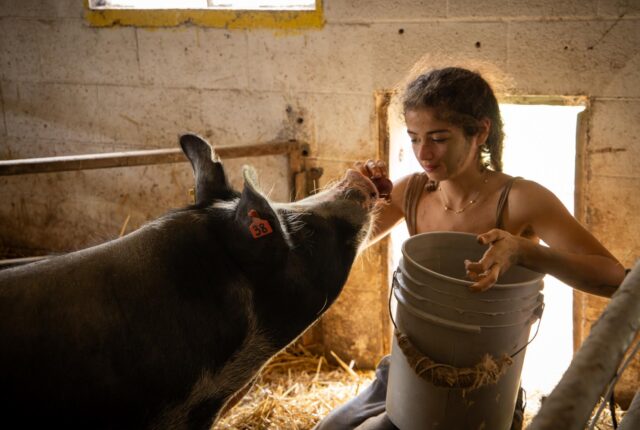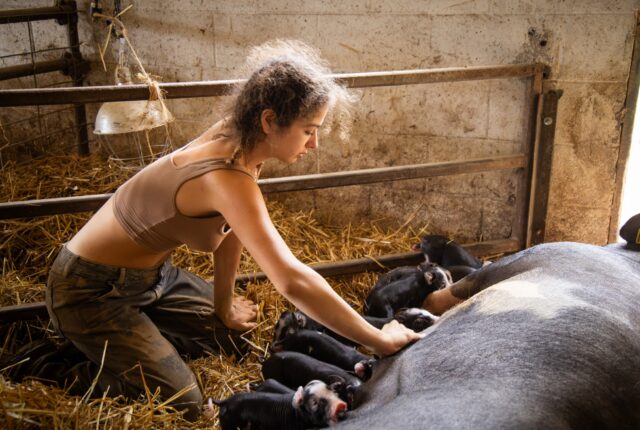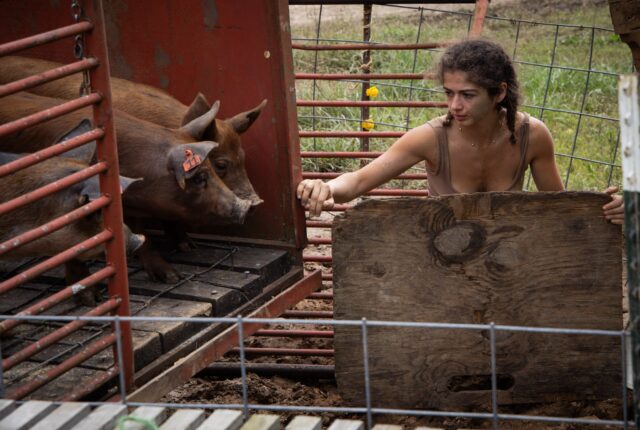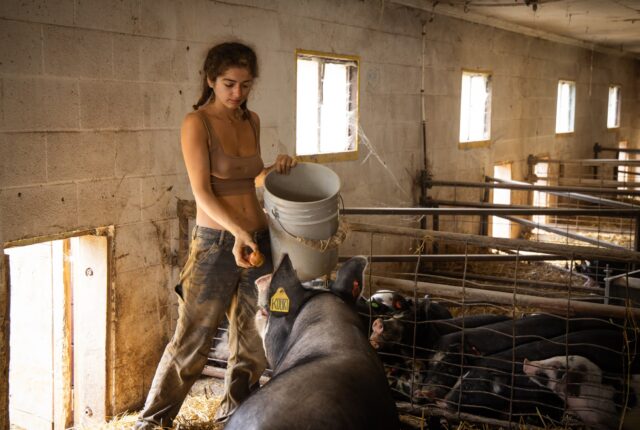As floodwaters rose during Hurricane Helene, student Sof Smith — the “Pig Boss” on Warren Wilson College’s Farm Crew — checked to ensure that the pigs were safe in the higher paddocks where she and other students had moved them before the storm. As she fed pigs, the lower fields were already underwater. A few minutes later, she noticed with alarm that the floodwaters had already risen halfway across the middle fields, where they had moved several six-week-old piglets and their mothers the day before to keep them safe. Sof knew then that the fields behind, where they had several more pigs, were certainly in worse shape.
“We had no idea it was going to get that bad,” Sof said. She had to make a quick decision — if she didn’t move the pigs, they would drown. These pigs had never been integrated together before and would likely fight. But at least they’d be alive. She and two other students got the piglets and their mothers into their houses.
“Just within those same minutes, I see it rising, and it’s rising so fast,” Sof said. So the students used tractors to elevate the piglet houses and move them higher in the driving rain and high winds.
“But the water is still rising, rising so fast. Around that point, we started seeing finishers [eight- to nine-month-old pigs] swimming into the paddock that we were in. And then I knew it’s really, really bad,” Sof said. “Those fields, for them to swim over the fence lines to get to us…”
They helped the finishers swim to land and evacuated all the pigs they could find to the highest field they had. They saw a pig swimming in one of the middle fields, which were now completely underwater as well, so she and the students waded and then swam out to rescue him. The waters were approaching chest high when they reached that pig and brought him back. On their way back, one of the students collected in her sweatshirt a few rats who were stuck in a tree and rescued them, too.
Many pigs were still missing and free ranging at that point, but Sof knew it was too dangerous to go back out in the floodwaters. She had to call Farm Manager Blair Thomspon and tell him that many of the pigs were likely going to die. “And then the line cut [because of the storm], and it was awful,” Sof said.
Sof watched the water, which was still rising too fast. The upper field where they had just secured the pigs would be underwater in ten minutes. So they moved them again, this time to the upper pig house in the farm core. If it didn’t hold, there would be nowhere else to go, so Sof and the others started making a dam with everything they could find, such as gravel and mineral bags. They rescued the lambs and weenies (three-month-old pigs), whose field was starting to flood as well.
In the end, the upper house held. They had saved the lives of many pigs and lambs.
“Everything since that first day has just been trying to find pigs, bringing them back to the Farm,” Sof said. And find them they have — it turns out that pigs are exceptional swimmers. Warren Wilson pigs have been found as far as several miles down the river in East Asheville. More were found on a new island in the river after the waters receded. Some joined the cattle herd. The vast majority of them have been found alive, and the Farm Crew students have corralled and caught them, bringing them home. Only 13 pigs — out of 130 — remain missing.
“I definitely thought that they were all gone,” Sof said, “but we’re recovering them day by day — new ones popping up, finding survivors. That has been the most inspiring part. I’m like, okay there’s more out there, they’re still alive! Keeping hope.”
In fact, Warren Wilson’s pigs increased in number a few days after the storm — Kourtney the sow gave birth to her 11 piglets. “We’re monitoring her hour by hour, but she’s doing a great job — she’s a first-time mom!” Sof said.
Why did Sof keep trying to save the pigs when circumstances were so dire? “Being in a leadership role and wanting to do a good job,” she said. “And, obviously, the pigs need us. I have been locking into that — knowing that I am needed.”
Sof is glad that she’s learning on a farm that is a college and not a business, because there’s more flexibility, and it’s okay to make mistakes. “That’s how you learn how to do something right—by learning what not to do.” She said that the Farm Crew students have built a strong trust working so closely together, making quick decisions, adapting, and solving problems as they go.
“The crew is amazing,” Sof said. “Everyone carries so much weight on their backs and is ready to go all the time. It’s great to be a part of that.”



